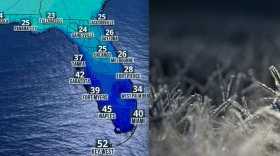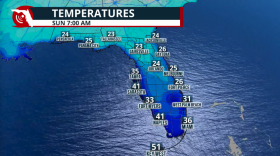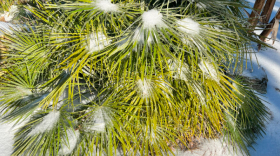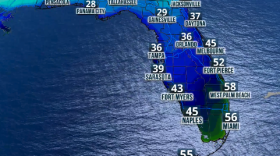-
Florida's severe weather week is here. And it's a great reminder that weather disasters can happen all year long - not just during hurricane season. From extreme cold to extreme heat, and everything in between, now is a great time to make sure you're prepared.
-
Punxsutawney Phil has predicted six more weeks of winter after emerging from Gobbler's Knob in western Pennsylvania.
-
Freeze alerts are in effect for Sunday night across much of Florida. This prolonged freeze will likely impact the crops in Florida.
-
AS the cold front pushes through Florida, the winds will pick up and Arctic air sinks over the state. Prepare for extreme cold.
-
New alerts are in effect for Florida, and watches will likely turn into warnings as soon as Friday, as the extremely cold temperatures will start to take over the state on Saturday and on Sunday for all.
-
This will not be the coldest air mass of the season, but it could be the coldest air mass felt in over a decade for some. Some flurries are also possible.
-
Ocean effect snow is a rare phenomenon in Florida. Similar to lake effect snow, it takes place when cold air moves over warm water.
-
The odds of significant cold, coastal, and marine impacts across South Florida this weekend and beyond continues to increase. An Extreme Cold Watch is in effect for the Lake Okeechobee region and coastal Palm beach County and a Freeze Watch is in effect for inland Collier, Miami Dade and Broward counties. Wind chills could drop into the 20s across all of South Florida early Sunday morning. Very breezy conditions are expected on Saturday afternoon through early Sunday morning as the strong cold front pushes through the area. Sustained winds 15-25 mph could gust up to 40 mph, with highest winds likely along the immediate coastlines. A Gale Watch is in effect for local waters beginning on Saturday afternoon and evening. Sustained winds of 30-40 knots with higher gusts is possible across the Atlantic and Gulf waters through Sunday afternoon. Wave heights could peak as high as 12 feet across the Gulf and Atlantic waters during the day on Sunday as well.
-
While the winter precipitation and dangerous weather stay well to the north, a cold front will bring cooler weather to Florida this coming week. Freeze and cold alerts are in effect.
-
Flight cancellations at Southwest Florida International Airport continued Monday with 55 just after 3 p.m. The cancellations are mostly due to the massive snow and ice-filled winter storm hitting the country from Texas to Maine. Airlines warned the storm could cause widespread cancellations and delays at some of the nation’s busiest airports.
WGCU is your trusted source for news and information in Southwest Florida. We are a nonprofit public service, and your support is more critical than ever. Keep public media strong and donate now. Thank you.










